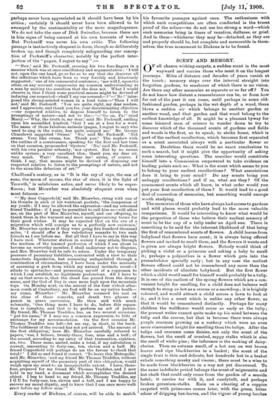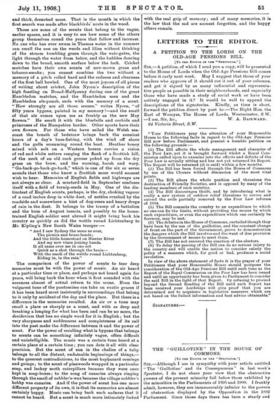SCENT AND MEMORY.
OF all chance wishing-carpets, a sudden scent is the most wayward and carries those who meet it on the longest journeys. Miles of distance and decades of years vanish at the touch ; memory steps over the interval straight into forgotten gardens, to seashores of which there is no vision. Are there any other memories so separate or so far off P You do not know how distant a remembrance can be, or from how far out of the past it can come, until 'perhaps in some old- fashioned garden, perhaps in the wet depth of a wood, there blows a sudden air which belongs to another garden or another wood, and that garden and that wood belong to the earliest knowledge of all. It might be a pleasant byway for some leisured man of science to wander down to try to discover which of the thousand scents of gardens and fields and woods is the first, so to speak, to strike home, which is . part of the earliest recollection, which becomes first separated as a scent associated always with a particular flower or season. Doubtless there would be no exact conclusions to such a search, but it might give the opportunity of asking some interesting questions. The searcher would constitute himself into a Commission empowered to take evidence on leading points such as : What is the scent which seems to you to belong to your earliest recollections ? What associations does it bring to your mind ? • Do any scents bring you unhappy recollections P and if so, what are they P Of the commonest scents which all know, in what order would you put your first recollection of them P It would lead-to a good deal of correction of memories, but something would emerge worth studying.
The memories of those who have always had access to gardens and wild places would probably lead to the more valuable comparisons. It would be interesting to know what would be the proportion of those who believe their earliest memory of scent to be the cup of a tulip under an April sun. There is something to be said for the inherent likelihood of that being the first of remembered scents of flowers. A child learns from babyhood that flowers have scent; it is always being offered flowers and invited to smell them, and the flowers it wants and is given are always bright flowers. Nobody would think of picking a violet or a primrose and asking a baby to smell it; perhaps a polyanthus is a flower which gets into the perambulator specially early ; but in any case the earliest flowers offered could not be remembered any mOre than the other incidents of absolute babyhood. But the first flower which a child would smell for himself would probably be a tulip. It is one of the earliest of the spring flowers which are a con- venient height for smelling, for a child does not balance well enough to stoop as low as a crocus or a snowdrop; it is brightly coloured, and would attract a child across a lawn to look at it; and it has a scent which is unlike any other flower,' so that it would be remembered distinctly. Perhaps for many children the wallflower would occur as early as the tulip ; the present writer cannot quite make up his mind between the tulip and the crocus, but that is because there were always purple crocuses growing on a rockery which were an even more convenient height for smelling than the tulips. After the tulips and crocuses come daisies, not only the scent of the flowers, but the smell of crushed, sappy stalks which is also the smell of white pins ; the inference is the making of daisy chains. Then an autumn smell, of a hot sun on wet brown leaves and ripe blackberries in a basket; the scent Of the single fruit is thin and delicate, but hundreds hot in a basket exhale something musky and vinous ; there must be a wine to be made from blackberries in a way not yet discovered. -To the same indefinite period belongs the scent of mignonette and hot chalk that could only come from the garden of a seaside hotel; it carries tar with it, and candytuft, and perhaps broken geranium-stalks. Rain on a clearing of a coppice carpeted with primroses comes later, with the green, bitter odour of dripping box-leaves, and' the vigour of young larches and thick, drenched moss. That is the month in which the first search was made after blackbirds' nests in the wood. Those are some of the scents that belong to the vague,
earlier spaces, and it is easy to see how some of the others group themselves round the years that follow and increase. No one who has ever swum in Thames water in the summer can smell the sun on the weeds and lilies without thinking of the stream tumbling green through the weir-gates, the light through the water from below, and the bubbles dancing down to the broad, smooth surface below the lock. Cricket matches have their own scents of new-mown grass and tobacco-smoke ; you cannot combine the two without a memory of a pitch rolled hard and the redness and clearness of the first ball bowled. One of the most joyous of all pieces of writing about cricket, John Nyren's description of the high feasting on Broad-Halfpenny during one of the great Hambledon matches, and the Hambledon men and the Hambledon ale-punch, ends with the memory of a scent.
"How strongly are all those scenes," writes Nyren, "of fifty years bygone, painted in my memory !—and the smell of that ale comes upon me as freshly as the new May flowers." He smelt it with the bluebells and orchids and primroses of the Hampshire border. Other sports have their own flowers. For those who have sailed the Welsh sea- coast the breath of bedstraw brings back the sunniest hours of a day's bass-fishing, with the wind off shore and the gulls screaming round the boat. Heather honey mixed with salt on a Western breeze carries a vision of red and white setters ranging the flank of a Scottish hill, of the neck of an old cock grouse poked up from the dry grass on the brow, and the warning, harsh and wary, "Go-back-go-back-go-back," which is one of the six or seven sounds that those who know a Scottish moor would soonest wish to hear. Memories of English fields and highways are not always so clear. A mustard-field in September confuses itself with a field of turnip-seeds in May. One of the dis- tinctest of English scents, perhaps, is the dry, choking vapour of a road inches deep in white dust, of nettles crushed by the roadside and somewhere a hint of dog-roses and heavy drops of rain in the dust. It belongs to the tramp of a battalion and the hum of August insects, and possibly to the home- trained English soldier sent abroad it might bring back his country as quickly as did the wattle round Lichtenberg to Mr. Kipling's New South Wales trooper:— " And I saw Sydney the same as ever,
The picnics and brass-bands ;
And the little homestead on Hunter River And my new vines joining hands.
It all came over me in one act
Quick as a shot through the brain—
With the smell of the wattle round Lichtenberg,
Riding in, in the rain."
The comparison of the power of scents to tear deep memories must be with the power of music. An air heard
at a particular time or place, and perhaps not heard again for years, will bring back the hour when it first sounded with the
sureness almost of actual return to the scene. Even the vulgarest tune of the pantomime can take on exotic graces if it has been heard most insistently in surroundings that belong to it only by accident of the day and the place. But there is a difference in the memories recalled. An air or a tune may recall a place as sharply as a scent, and with as deep and
breaking a longing for what has been and can be no more, the desiderium that has no single word for it in English ; but the
very sharpness and suddenness and completeness of its call into the past make the difference between it and the power of scent. For the power of recalling what is bygone that belongs to scents can be something infinitely vague, often difficult and unintelligible. The music was a certain tune heard at a certain place at a certain time ; you can date it all with clear
precision. But the scent of sun in the chalice of a tulip belongs to all the distant, undateable beginnings of things,—
to the queerest contradictions, to the most haphazard comings and goings; to the scent of pinewoods wrapped in a particular soap, and lackey moth caterpillars because they were once kept in soap-boxes ; to the song of canaries always ringing through the smell of cobbler's-wax because the village cobbler's hobby was canaries. And if the power of scent has one more different property of its own, it is that its memories are almost certainly happy. Music can bring back such sadness that it cannot be heard. But a scent is mach more intimately linked with the real grip of memory; and of many memories, it is the law that the sad are soonest forgotten, and the happy others remain.







































 Previous page
Previous page